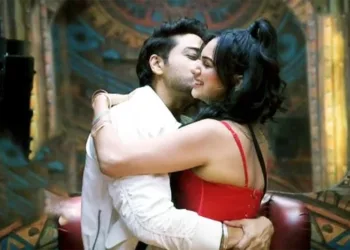The Continent is about to witness a historic changing of the guard. The Witcher Season 4 premieres October 30, 2025, marking Liam Hemsworth’s debut as Geralt of Rivia after Henry Cavill’s departure shook the fandom. With all eight episode titles and runtimes now revealed, we’re getting our clearest picture yet of what this penultimate season holds. Spoiler alert: It’s the shortest season yet, but that doesn’t mean the stakes are any lower. Geralt, Yennefer, and Ciri face separation, war, and unlikely alliances that will test everything they’ve built.
Table of Contents
The Witcher Season 4: Essential Info
| Category | Details |
|---|---|
| Premiere Date | October 30, 2025 |
| Episode Count | 8 episodes |
| Total Runtime | 427 minutes (7 hours 7 minutes) |
| New Geralt | Liam Hemsworth |
| Returning Cast | Anya Chalotra (Yennefer), Freya Allan (Ciri) |
| Season Status | Penultimate (Season 5 is final) |
| Platform | Netflix (Worldwide) |
| Based On | Andrzej Sapkowski’s book series |
| Production | Filmed back-to-back with Season 5 |
What Happened Last Season?
Season 3 ended with the Continent in chaos. Geralt barely survived his brutal battle against the mage Vilgefortz, who was working with Nilfgaard. When Nilfgaardian Emperor Emhyr claims to have found Ciri—who’s actually a decoy—Geralt immediately plans a rescue mission with help from Jaskier and the archer Milva.
Meanwhile, the real Cirilla of Cintra finds herself alone and vulnerable, eventually meeting a group of outlaws called The Rats. This separation sets up Season 4’s central tension: our core trio scattered across a war-torn Continent, each facing their own challenges while desperately trying to reunite.

According to Netflix’s official synopsis:
“After the Continent-altering events of Season 3, Geralt, Yennefer, and Ciri find themselves separated by a raging war and countless enemies. As their paths diverge and their goals sharpen, they encounter unexpected allies eager to join their journeys. And if they can accept these found families, they just might have a chance at reuniting for good…”
For more on Netflix’s fantasy series strategy, visit Netflix’s official genre hub.
Complete Episode Breakdown: Titles & Runtimes
Episode 1: “What Doesn’t Kill You Makes You Stronger” (58 minutes) The longest episode sets up the season’s stakes, showing how each character has survived their Season 3 ordeals and what challenges they now face. Expect Liam Hemsworth’s introduction as Geralt to be handled carefully, establishing his version of the character while respecting what Cavill built.
Episode 2: “Dream of a Wish Fulfilled” (60 minutes) The season’s longest episode likely explores what each character truly wants versus what destiny demands. The title suggests wish fulfillment gone wrong or the dangerous allure of getting what you think you want.
Episode 3: “Trial by Ordeal” (51 minutes) This title hints at a specific character facing judgment or surviving a brutal test. Given The Witcher universe, this could reference anything from literal trials to combat challenges that determine worthiness.
Episode 4: “A Sermon of Survival” (54 minutes) Religious or philosophical undertones suggest someone preaching about what it takes to survive in a world at war. The mid-season placement indicates shifting alliances and moral compromises.
Episode 5: “The Joy of Cooking” (55 minutes) The darkly comedic title might reference the infamous cookbook while hinting at more sinister undertones—perhaps manipulation, transformation, or a deceptively cheerful episode title masking darkness.
Episode 6: “Twilight of the Wolf” (48 minutes) The shortest episode carries enormous weight. “Twilight” suggests endings, and “Wolf” references Geralt himself (witchers are called wolves). This could mark a crucial turning point or devastating loss.
Episode 7: “What I Love I Do Not Carry” (50 minutes) A philosophical title about letting go, sacrifice, or the burden of love. Someone makes an impossible choice between what they love and what they must do for the greater good.
Episode 8: “Baptism of Fire” (51 minutes) The season finale references one of Sapkowski’s novels, suggesting an initiation through violence. Characters emerge transformed by their trials, setting up the final season’s conflicts.
For our complete guide to The Witcher book series, check our fantasy literature analysis.
The Shortest Season Yet: What It Means
At 427 minutes total, Season 4 is significantly shorter than previous seasons:
- Season 1: 478 minutes
- Season 2: 458 minutes
- Season 3: 451 minutes
- Season 4: 427 minutes
This downward trend suggests tighter storytelling and more focused narratives. Rather than sprawling subplots, Season 4 appears to streamline its story toward the series’ conclusion. For a penultimate season, this makes sense—everything should be building toward the final confrontation rather than introducing unnecessary complications.
The shorter runtime also reflects Netflix’s evolving approach to fantasy series. After the backlash to split seasons and filler content, they’re prioritizing compact, purposeful storytelling over inflated episode counts.

The Liam Hemsworth Transition
The elephant in the room is the recasting of Geralt. Henry Cavill departed due to creative differences and scheduling conflicts (he believed he was returning as Superman). Liam Hemsworth faces the unenviable task of replacing a fan-favorite actor who embodied the role for three seasons.
Hemsworth brings different strengths—he’s proven his action credentials in The Hunger Games series and demonstrated dramatic range in projects like The Dressmaker. The production filmed Seasons 4 and 5 back-to-back, giving Hemsworth continuity and allowing him to fully develop his interpretation.
Book readers know that Geralt undergoes significant physical and emotional changes in the later novels, providing narrative justification for a different portrayal. The question isn’t whether Hemsworth can act—it’s whether fans will accept someone new in such an iconic role.
For analysis of successful recasting in television, visit our entertainment industry insights.
Expanding the Witcher Universe
Season 4 doesn’t exist in isolation. Netflix continues building a broader Witcher franchise:
The Rats: A Witcher’s Tale – A feature-length special focusing on the outlaw group that Ciri joins, providing crucial context for her Season 4 storyline.
Blood Origin – The prequel series exploring the creation of the first Witcher and the Conjunction of the Spheres.
Animated Films – Nightmare of the Wolf and Sirens of the Deep expand lore through different animation styles.
This franchise approach mirrors how streaming services now view intellectual property—one successful show spawns an entire universe of interconnected content. According to Netflix’s official Witcher page, they’re committed to expanding this world even after the main series concludes.
What to Expect from Season 5
With Season 4 filmed back-to-back with the final season, we know the endgame is already mapped out. Season 5 will presumably resolve the conflicts with Nilfgaard, reunite our scattered heroes, and provide closure to storylines spanning five seasons.
The shorter episode count for Season 4 suggests Season 5 might follow suit, delivering a focused conclusion rather than dragging out the ending. For fans worried about rushed conclusions, remember that both seasons were planned and filmed together, allowing for proper narrative flow.
The Witcher Season 4 premieres October 30, 2025, on Netflix. For more fantasy series coverage, casting news, and streaming updates, visit TechnoSports.
FAQs
Why did Henry Cavill leave The Witcher?
Henry Cavill’s departure resulted from a combination of creative differences and scheduling conflicts. Reports suggest Cavill, a passionate fan of the source material, became frustrated with the show’s deviations from Andrzej Sapkowski’s books. He advocated strongly for staying more faithful to the novels, which apparently created tension with writers and producers who wanted more creative freedom. Additionally, at the time of his departure announcement, Cavill believed he was returning to play Superman in the DC Extended Universe, which would have created significant scheduling conflicts. When that Superman project fell through, it was too late—Liam Hemsworth had already been cast. While disappointing for fans who loved Cavill’s portrayal, his departure opened opportunities to explore different interpretations of Geralt’s character in the later, darker parts of the book series.
Do I need to watch Blood Origin before Season 4?
No, Blood Origin is not required viewing for The Witcher Season 4, though it does provide interesting historical context. The prequel series explores events 1,200 years before the main show, explaining the creation of the first Witcher, the Conjunction of the Spheres (which brought monsters to the world), and the fall of the elven civilization. While these backstories enrich your understanding of the world’s mythology, Season 4’s plot focuses on present-day conflicts and doesn’t require knowledge of ancient history. That said, Blood Origin does connect to the main series through specific characters and prophecies, so completists might appreciate watching it. The recommended viewing order for maximum enjoyment is: The Witcher Seasons 1-3, Nightmare of the Wolf (animated film), then Season 4. Save Blood Origin for between-season viewing if you want deeper lore without affecting your understanding of the main plot.







